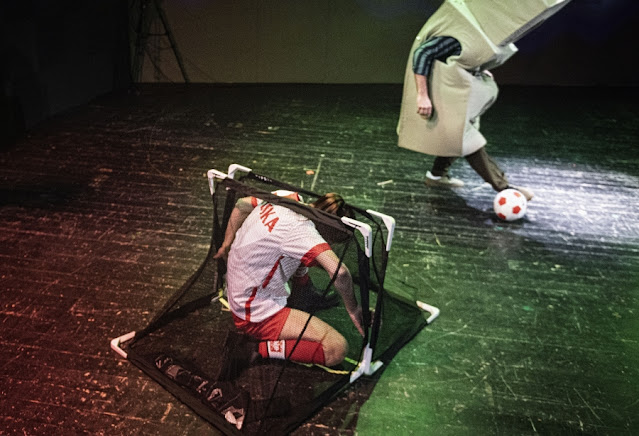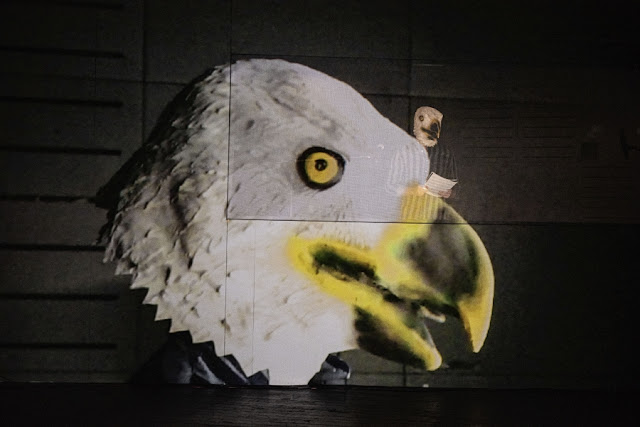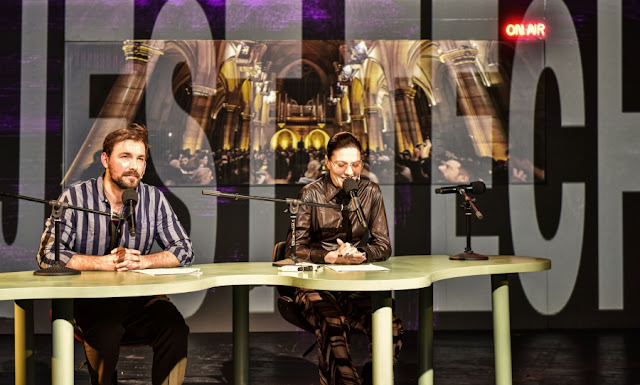RADIO MARIIA (2022)
political fiction
Let’s imagine the future. Let’s imagine that even the most improbable scenarios are possible. Let’s imagine the unimaginable.
For example: the Catholic Church in Poland disappears. There are no more religion classes in schools, no more Polish pope in the public space. Refugees live in presbyteries, churches are now concert halls (or supermarkets?). Human rights are above the interests of the followers of one religion. A Polish person doesn’t have to be a Catholic anymore to truly be a Pole. The Polish language loses the word “concordat”. And so on and so forth. How did that happen and what are the consequences of this breakthrough? Did the Church also disappear from our minds?
Let’s imagine that we are already there. In the future. That we are making it right now, right here. Together we are designing alternative models of society, culture, and politics. Where are the limits of our imagination? What stops it? What doesn’t let it be radical? What doesn’t allow a utopia to come true?
Roza Sarkisian is a renowned Ukrainian theatre director, seen as the most original and creative theatrical artist of Ukraine. You can find more info about the artist here.
The performance is a part of the European project "Face to Faith" ("Creative Europe" program).
creatives
director – Roza Sarkisian
texts – Oksana Czerkaszyna, Oskar Stoczyński, Joanna Wichowska, Krysia Bednarek
dramaturgy – Joanna Wichowska, Krysia Bednarek
set designer and costumes – Kornelia Dzikowska
lighting and video – Adam Zduńczyk
music – Dariusz Cichosz
stage manager – Barbara Sadowska
director's assistant – Krysia Bednarek
consultants – Zuzanna Hertzberg, Małgorzata Szutowicz
experts on the radio – Elżbieta Korolczuk, Magdalena Staroszczyk
cast – Oksana Czerkaszyna, Oskar Stoczyński
reviews
Let’s imagine the future. Let’s imagine that even the most improbable scenarios are possible. Let’s imagine the unimaginable.
For example: the Catholic Church in Poland disappears. There are no more religion classes in schools, no more Polish pope in the public space. Refugees live in presbyteries, churches are now concert halls (or supermarkets?). Human rights are above the interests of the followers of one religion. A Polish person doesn’t have to be a Catholic anymore to truly be a Pole. The Polish language loses the word “concordat”. And so on and so forth. How did that happen and what are the consequences of this breakthrough? Did the Church also disappear from our minds?
Let’s imagine that we are already there. In the future. That we are making it right now, right here. Together we are designing alternative models of society, culture, and politics. Where are the limits of our imagination? What stops it? What doesn’t let it be radical? What doesn’t allow a utopia to come true?
Roza Sarkisian is a renowned Ukrainian theatre director, seen as the most original and creative theatrical artist of Ukraine. You can find more info about the artist here.
The performance is a part of the European project "Face to Faith" ("Creative Europe" program).
creatives
director – Roza Sarkisian
texts – Oksana Czerkaszyna, Oskar Stoczyński, Joanna Wichowska, Krysia Bednarek
dramaturgy – Joanna Wichowska, Krysia Bednarek
set designer and costumes – Kornelia Dzikowska
lighting and video – Adam Zduńczyk
music – Dariusz Cichosz
stage manager – Barbara Sadowska
director's assistant – Krysia Bednarek
consultants – Zuzanna Hertzberg, Małgorzata Szutowicz
experts on the radio – Elżbieta Korolczuk, Magdalena Staroszczyk
cast – Oksana Czerkaszyna, Oskar Stoczyński
reviews
- Tomasz Miłkowski, AICT – sekcja polska Międzynarodowego Stowarzyszenia Krytyków Teatralnych
- Julia Sarzyńska, „Czas Kultury”
Witold Mrozek, Polska po Kościele. W ten weekend wydarzyło się w teatrze coś bardzo ważnego, wyborcza.pl (pol.)
Agnieszka Graff, Spektakl "Radio Mariia" niechybnie obrazi czyjeś "uczucia religijne", bo cały jest z owych uczuć kpiną, www.wysokieobcasy.pl
Przemek Gulda, Pokazali Polskę bez Kościoła katolickiego. "Bezlitosna kpina z tego, co złe", ksiazki.wp.pl, 14 stycznia 2022 (pol.)
Aneta Kyzioł, Recenzja spektaklu: „Radio Mariia”, reż. Roza Sarkisian, www.polityka.pl, 2022 (pol.)
Rafał Węgrzyniak, ZWIASTUN DECHRYSTIANIZACJI POLSKI, Teatrologia info (pol.)
Tomasz Miłkowski, Fantazja antykatolicka, Dziennik Trybuna, 19 stycznia 2022 (pol.)
Kama Pawlicka, Radio Mariia | e-teatr.pl, Teatr w Polsce - polski wortal teatralny (pol.)
Jacek Cieślak, Spektakl o rocznicy likwidacji Kościoła Katolickiego, Rzeczpospolita (pol.)
Michał Centkowski, Jak daleko do normalności | e-teatr.pl, Teatr w Polsce - polski wortal teatralny[dostęp 2022-01-25] (pol.)
Rafał Turowski, Radio Mariia | e-teatr.pl, Teatr w Polsce - polski wortal teatralny (pol.)
Julia Sarzyńska, Upadnie Babilon?, Czas Kultury (pol.)
Piotr Morawski, Granice wyobraźni / Teatr / dwutygodnik.com, www.dwutygodnik.com (pol.)
Aneta Kyzioł, Klątwa Dziadów, www.polityka.pl, 2022 (pol.)
Agnieszka Graff, Spektakl "Radio Mariia" niechybnie obrazi czyjeś "uczucia religijne", bo cały jest z owych uczuć kpiną, www.wysokieobcasy.pl
Przemek Gulda, Pokazali Polskę bez Kościoła katolickiego. "Bezlitosna kpina z tego, co złe", ksiazki.wp.pl, 14 stycznia 2022 (pol.)
Aneta Kyzioł, Recenzja spektaklu: „Radio Mariia”, reż. Roza Sarkisian, www.polityka.pl, 2022 (pol.)
Rafał Węgrzyniak, ZWIASTUN DECHRYSTIANIZACJI POLSKI, Teatrologia info (pol.)
Tomasz Miłkowski, Fantazja antykatolicka, Dziennik Trybuna, 19 stycznia 2022 (pol.)
Kama Pawlicka, Radio Mariia | e-teatr.pl, Teatr w Polsce - polski wortal teatralny (pol.)
Jacek Cieślak, Spektakl o rocznicy likwidacji Kościoła Katolickiego, Rzeczpospolita (pol.)
Michał Centkowski, Jak daleko do normalności | e-teatr.pl, Teatr w Polsce - polski wortal teatralny[dostęp 2022-01-25] (pol.)
Rafał Turowski, Radio Mariia | e-teatr.pl, Teatr w Polsce - polski wortal teatralny (pol.)
Julia Sarzyńska, Upadnie Babilon?, Czas Kultury (pol.)
Piotr Morawski, Granice wyobraźni / Teatr / dwutygodnik.com, www.dwutygodnik.com (pol.)
Aneta Kyzioł, Klątwa Dziadów, www.polityka.pl, 2022 (pol.)

.jpg)







